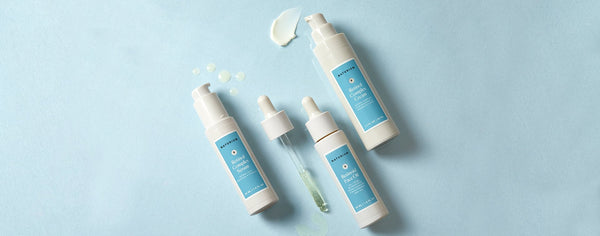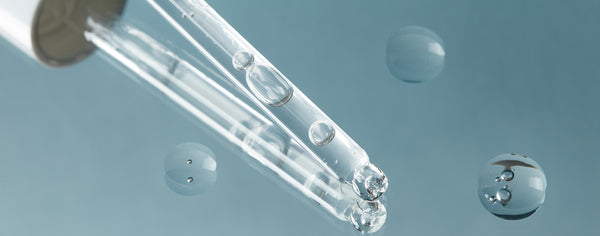Why the PH of Skincare Matters

So what’s the deal with pH? Does pH really matter? The pH of a product affects skin and can often lead to more harm than good. At NATURIUM, we believe in pH-appropriate formulations that work with the skin for optimal efficacy. Read more to learn all about pH and why it matters.
Naturium was born out of a need to create pH-appropriate, biocompatible formulas that were also clinically effective. Naturium products preserve the skin’s acid mantle, which in turn minimizes inflammation and redness, stabilizes the microbiome, reduces dryness, and maintains integrity of the skin. We created products comparable in pH to that of the skin or slightly lower than the pH of skin, a process known as acidification. Studies have shown that lowering the pH of your stratum corneum enhances bio-processes and can help with your skin’s innate immunity and microbiome. Acidic pH treatments such as the use of topical acids enhance barrier recovery, improve stratum corneum cohesion, and improve skin hydration.1 However, it is possible when formulating skincare products to have a pH too low, which results in redness, inflammation, postinflammatory hyperpigmentation, irritation, and stinging.2 Naturium products are formulated to the optimal pH for efficacy, safety, and biocompatibility.
Naturium products are formulated to the optimal pH for efficacy, safety, and biocompatibility.
The term pH is a measure of the concentration of hydrogen ions in a water based solution and represents the acidity or alkalinity of that solution. The pH is given on a logarithmic scale that typically ranges from 0 to 14 with values above pH 7 being alkaline or basic and values below pH 7 being acidic. Since pH is reported in a logarithmic fashion rather than linearly that means pH 4 is 10 times more acidic than pH 5. While pH 7, the pH of water, is neutral, that does not mean it is the optimal pH for skin. The term “acid mantle” was coined in the 1920’s by physicians Marchionini and Schade who identified the acidity of the skin and noticed an acidic protective veil or “mantle” on the skin.3 They noted various skin pathologies that correlated with elevated pH levels. Healthy skin ranges from pH 4.5 to pH 5.0 while the average skin is between pH 5.0 and pH 5.5. Dry skin has a pH shifting up to 5.5-6.0 and atopic skin has a pH above 6.0. That means healthy skin is 10 times more acidic than dry skin and more than 10 times acidic than atopic skin.
The skin has a pH gradient with the underlying layers of the skin around neutral or pH 7 and the upper layers or stratum corneum gradually reaching pH 4.5-5.0.4 This gradient works as a trigger for key enzymes responsible for maintaining healthy skin. There are a number of enzymatically-dependent biological processes that are sensitive to pH including desquamation or cell turnover, lipid and ceramide synthesis, NMF (natural moisturizing factor) synthesis, and antibacterial activity which includes our microbiome. The stratum corneum’s acid mantle is formed and maintained by amino acids in the natural moisturizing factor, fatty acids secreted from the sebaceous glands, and the sodium-hydrogen antiporter 1(NHE-1). When your skin’s pH trends upwards or becomes more alkaline, the activity of those crucial enzymes declines and the skin becomes compromised affecting the structure and integrity of your skin. At elevated pH levels, the skin will produce less lipids and ceramides, produce less NMF, have decreased antimicrobial protection and have uneven desquamation. This translates to transepidermal water loss, decreased barrier repair, increased inflammation and redness, disruption of your natural flora, skin flaking and dryness, reduced skin elasticity, and uneven skin texture.5
There are a number of factors that can elevate the pH of your skin such as age, skin disorders, environmental influences, and cosmetic products. As you age, the level of triglycerides and sebum produced decreases and with that comes elevated skin pH. Compromised, acne-prone, and stressed skin also tend to have a higher pH.6 A significant and controllable factor that plays a role in your skin’s pH is the cosmetic products in your skin care regimen.7 Alkaline skin care products disrupt the skin’s microflora, disrupt the lipid bilayer, and elevate your skin’s pH. Your skin has the ability to initially buffer and bounce back from alkaline assaults but when used over time, alkaline products make the skin more sensitive and susceptible to environmental aggressors and skin irritants.8
Naturium products are formulated to the optimal pH for efficacy, safety, and biocompatibility. Using our pH-balanced formulas can restore and maintain the pH of skin, a therapeutic strategy toward healthy and radiant skin.

SOURCES:
- 1 https://www.ncbi.nlm.nih.gov/pubmed/30125885
- 2https://www.cir-safety.org/sites/default/files/ahas.pdf
- 3https://www.ncbi.nlm.nih.gov/pubmed/30125885
- ...
- 4https://www.ncbi.nlm.nih.gov/pubmed/7817676
- 5https://www.ncbi.nlm.nih.gov/pmc/articles/PMC4552322/
- 6https://www.ncbi.nlm.nih.gov/pmc/articles/PMC5605222/
- 7https://www.medicaljournals.se/acta/content_files/files/pdf/93/3/3854.pdf**really good journal article
- 8https://www.ncbi.nlm.nih.gov/pubmed/19467032







